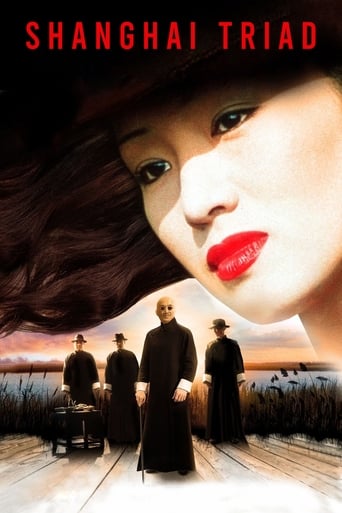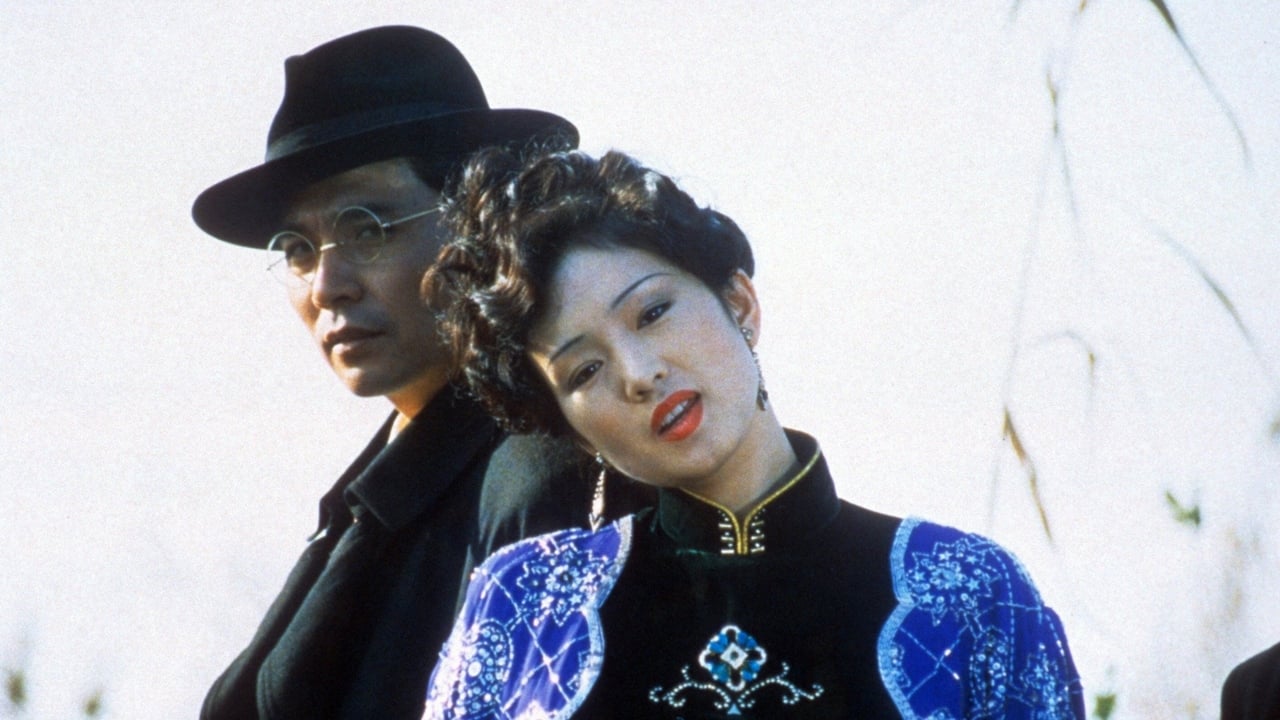lasttimeisaw
There is no dispute Yimou Zhang is still the best-known working director from China, but after the lucrative-but-critics-panning CURSE OF THE GOLDEN FLOWER (2006, a 6/10), which also marks a reunite with Goddess Li Gong after 11 years, his successive works (A WOMAN, A GUN AND A NOODLE SOUP 2009, a Chinese adaption of Coen Brothers BLOOD SIMPLE. 1984; UNDER THE HAWTHORN TREE 2010, an over-innocuous love story under the backgrounds of Cultural Revolution of the 1960s and 70s; and his latest, a westerner saving Chinese women from Japanese invaders during Nanking 1937 stars the newly Oscar-crowned Christian Bale, THE FLOWERS OF WAR 2011; I haven't watch any of them yet) all have received pretty lukewarm feedbacks and even dire dissatisfaction from both audience and critics. So since then his domestic reputation has been quite disproportionate to his renowned international prestige. SHANGHAI TRIAD, Yimou Zhang's period drama set in Shanghai of 1930s, has eluded me for 17 years, but sincerely culminates Zhang's ingenuity in his virtuoso cinematography scale, while the story itself, doesn't match his previous masterpieces, namely, TO LIVE (1994, an 8/10), THE STORY OF QIU JU (1992, an 8/10), JU DOU (1990, an 8/10) or his groundbreaking debut RED SORGHUM (1987, a 9/10). The ugly truth is that Zhang is never an exceptional storyteller, if he has an excellent script (the said four films), with the aid of which the films surge onto an elated dimension of ethos, otherwise, the outcome could be a lesser achiever notwithstanding with stunning shots abound. Take this film for example, it owns an experimental use of camera angles, DP Yue Lv even garners an Oscar nomination, for me the cunning tactic is the maneuver of two drastically different terrains: Shanghai's lavish villa for the richest and an ominous countryside island with wild weed backdrops, they are in parallel to dissect the storyline with an absorbing visual momentum which flourishes successfully to meet the eyes, especially for those non-Chinese audience bearing some exotic curiosities.The cast is solid, Gong Li (at her prime-time being the muse of Zhang's oeuvre) does provide a wide range of emotional scopes as the boss' mistress whose ill-fated destiny sparks a woeful compassion, and surpasses the common dolly bird blandness, but the film still has too many corny characters (basically all the male characters here, with Baotian Li, the ruthless gang lord as a borderline exception) and lacunae in the script which should not have been underwritten (an non-fictional gangster's life could be more intriguing and intricate). ps: As a home-grown Chinese, Gong Li's cabaret renditions are quite amateurish and lip- synched, while the music numbers are sentimentally undue, which I have already had a bellyful of.
Martin Teller
A country lad in brought to Shanghai to be a servant to a gangster's moll. There's not a whole lot to say about this movie, it's pretty standard stuff about evil corrupting and destroying everything it touches, et cetera. Li Gong's performance is good as always, and the sumptuous photography is a delight to behold, although the color palette appears muted on the DVD. The plot and Li's character take some interesting turns in the third act, but it's not quite enough up for the mundane build-up. Although it's not one of Zhang's best, especially from this period, it's perfectly watchable and sticks with you for a bit.
Dennis Littrell
This could be an American gangster movie except that it is so beautiful. Well, that and the fact that it takes place in Shanghai in the 1930s. Gong Li plays Xiao Jingbao ("Bijou") the moll, a self-centered, vain, mean, slutty songstress kept by the "Boss" (Baotian Li) of Shanghai's underworld. As usual with director Zhang Yimou every set is gorgeous and artfully planned, the story compelling, and the human psychology veracious.We see the events through the eyes of Shuisheng (Wang Xiaoxiao) a 14-year-old boy from the country who, because he is a member of the trusted Tang family, is brought to the city to be a servant to Bijou. She treats him and everybody else like dirt while she plays the Boss for a fool. We can guess that her comeuppance will be severe. Oh, but HOW severe? In this Zhang Yimou goes beyond what one has seen in American gangster movies and gives us something from Machiavelli and Genghis Kahn.The film is a little slow in parts and Gong Li plays her role so well that she is most disagreeable—that is, until what I might call the "turn." This occurs when she is forced to go with the Boss to the country after a rival has attempted to kill him. Bijou is bored. There is nothing for her to do so she goes to the house of a country widow named Cuihua (Baoying Jiang) with a nine year old daughter Ah Jiao (Yang Qianquan) to lord it over her and to amuse herself with these country bumpkins. But the surprise is that in the process she is returned to her childhood when she herself was a country bumpkin. Zhang Yimou plays this part of the film masterfully as we slowly realize that Bijou is jealous of Cuihua and her poor but idyllic life. But that is something she can never admit to herself as she spies on Cuihua with her lover. One almost gets the sense that Bijou would like to be in Cuihua's place with that crude country lover.At one point Bijou makes Cuihua loan her some of her peasant clothes and then takes delight in wearing them. We can see that Bijou is in denial about how much of a slave to the master she really is and how unsatisfying is the life of a kept woman regardless of how well kept. She realizes that her life is empty. And now we see a certain generosity of spirit: she gives the boy some silver coins; she tells the boss to spare the woman, but it is too late. Because you talked to her she knows too much, he says. He adds, you see, it is your fault again.This film sits well with the current communist government of China despite or perhaps partly because the Boss with his small round eyeglasses looks a little like a Chinese Trotsky. But more importantly Zhang Yimou's depiction of the criminal decadence of China in the 30s before the rise of communism is exactly what Maoists like to see. Communism freed the Chinese from all that, is perhaps the idea.This is not the only film of Zhang Yimou's to play to communist sensibilities. His Raise the Red Lantern (1991) also shows in a different way the moral corruption of what might be called the ancient regime. But Zhang Yimou can be forgiven for playing to the powers that be because he does it with subtle irony and for a purpose, the purpose being to give himself the celebrity and an international reputation so that he is able to make films that might in some way criticize the communist state while he maintains a position of loyalty to that state. Working from within, it might be said. We see this in his To Live (Huozhe) from 1994 in which the hardships under communism are not euphemized. To be more exact it might be said that Zhang Yimou sees the excesses of Mao's regime but realizes that Mao was a stage through which China had to pass; and at any rate, who would want to go back to the time of the capitalist gangsters? The airy, white tops of the reeds wave in the breeze. The colors are straw and the cottage on the island is neat and holds out against the rain. Inside Cuihua cooks and weaves a basket. She is content. Bijou, in her red dress and her red lips, wearing her jewelry and her superior manner, is not. She recalls the mulberry trees of her childhood and how she would climb the trees and eat the tree-ripened fruit. All the riches in the world cannot bring back those days, nor can she return to them.She would like to take nine year old Ah Jiao with her back to Shanghai. Ironically Ah Jiao in her innocence wants to be like "Miss," which is Bijou's "title." Ironically, however, it is the Boss who takes the little girl back so that she can grow into the next Bijou.The ending of the film is as brutal as anything you might expect to see, and yet there is a kind of poetic justice in what happens. In part. Zhang Yimou is always about politics, even though the politics are sometimes "just" domestic politics, as in Raise the Red Lantern. But he does the politics in a way that leaves no doubt: justice or what comes to pass is shaped by those who hold the power, whether it is the power of the state, or the power of the gangster boss, or the power of the master of the house, not by those who do not hold power. And that is the trenchant reality behind the great beauty of any Zhang Yimou film.(Note: Over 500 of my movie reviews are now available in my book "Cut to the Chaise Lounge or I Can't Believe I Swallowed the Remote!" Get it at Amazon!)
MartinHafer
This story is told through the eyes of a boy who has just begun working as an underling for a Chinese mobster in the 1930s. It seems the young man is the servant to the mistress of the triad chief and he is treated, at times, more like a slave than a person. The lady is quite beautiful but also seemed very petulant and foolish throughout the film--making it very surprising indeed that this boy bonded so quickly with the lady. Had I been in the boy's place, I probably would have taken the first chance to either poison her or run! SHANGHAI TRIAD was nominated for the Best Cinematography Oscar and this certainly isn't surprising when you see this film. It's actually pretty rare for a foreign film to get this nomination, but this movie was one of the most artistic films I have seen in ages. The camera-work is great--with the wonderful use of filters, excellent framing techniques and grand colors.Unfortunately, while the film is very beautiful, the story itself is too often sterile and one of its main characters (played by Gong Li) is just too unlikable--seeming like a complete brat. While the mob boss is quite amoral and vicious, at least you didn't find yourself hating him quite as much--especially since he was a smart guy. Additionally, all too often, events occur off-screen and you only hear about them or catch glimpses of the results--giving the film very little energy. Fortunately, despite being slow, the film does end very well with some interesting twists--but not quite enough to redeem the film. Overall, it's very watchable but with more energy and a more involving story, it could have been so much better.


 AD
AD



